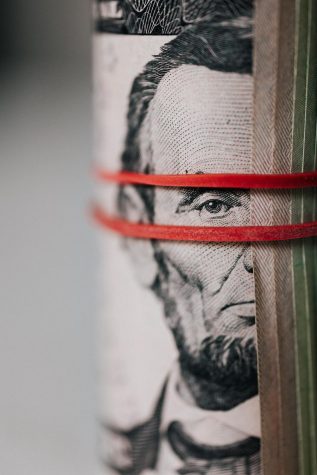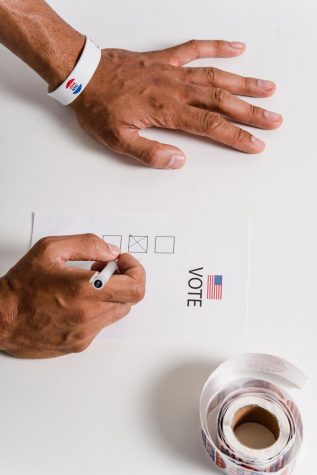One Nation, Divisible
The foundation of our democracy was built on the principle of being a united nation, one that cared for our fellow American brothers and sisters. For this reason, the framers of the constitution were vocal on the prevention of one thing… the creation of a two-party system. John Adams once warned against the two-party system, something that was predicted to occur as it in most democratic systems, and Adams even said that “a division of the republic into two great political parties… is to be dreaded as the great political evil.” Oftentimes overlooked, the effects of having only two political categorizations in this country has led to chaos. In my opinion, the two-party democratic system has had polarizing effects on our country, damages the growth of national conversation, and furthermore weakens the loyalty to the introduction of individualistic ideals.
The creation of political parties first began in 1796, which “was the first election in American history where political canidi dates at the local, state, and national level began to run for office as members of organized political parties” (Ushistory.org). This was a new kind of voting that the American people had not seen before, and the parties began to slowly create a division between voters. Even Washington saw the underlying threat of the formation of such parties, and in his farewell address warned that “the alternate domination of one faction over another, sharpened by the spirit of revenge, natural to party dissension, which in different ages and countries has perpetrated the most horrid enormities, is itself a frightful despotism.” It was the belief of the founders that political parties would begin to overshadow the smaller voices of the American people, eventually leading to our own demise.
dates at the local, state, and national level began to run for office as members of organized political parties” (Ushistory.org). This was a new kind of voting that the American people had not seen before, and the parties began to slowly create a division between voters. Even Washington saw the underlying threat of the formation of such parties, and in his farewell address warned that “the alternate domination of one faction over another, sharpened by the spirit of revenge, natural to party dissension, which in different ages and countries has perpetrated the most horrid enormities, is itself a frightful despotism.” It was the belief of the founders that political parties would begin to overshadow the smaller voices of the American people, eventually leading to our own demise.
The polarizing effects of these parties were not lost on Washington and Adams. Many relationships have been tainted because of political party affiliation, and it is rare that an individual concedes with 100% of the positions set by their party. But, because of the institutionalization of the electoral college, votes are then forced onto a candidate either representing the Republican or Democratic parties. Research has shown that the many individuals within the party feel as if the opposing party is a threat to the welfare of the nation. In fact, “27% of Democrats see the Republican party as a threat to the nation’s well-being” and “37% of Republicans see Democrats as a threat to the nation’s well-being” (Pew Research Center). It is this thought process that has since caused the nation to be so emotionally and morally divided.
 In addition, the long-fought struggle for power has caused the national conversation to be limited only to the interests of specific parties. By shying away from the ideas of third party candidates, it also limits the overall progression and national conversation of the country. Politicians responsible for the legislature must work “to appeal for the support of a majority of voters, a party must present a program sympathetic to the desires of most of the politically active elements of the population… [and] in effect, the party is a coalition for the purpose of campaigning for office” (Britannica). Many politicians go against their own personal beliefs in order to appeal to their party, but what is the consequence of abolishing the two-party system altogether?
In addition, the long-fought struggle for power has caused the national conversation to be limited only to the interests of specific parties. By shying away from the ideas of third party candidates, it also limits the overall progression and national conversation of the country. Politicians responsible for the legislature must work “to appeal for the support of a majority of voters, a party must present a program sympathetic to the desires of most of the politically active elements of the population… [and] in effect, the party is a coalition for the purpose of campaigning for office” (Britannica). Many politicians go against their own personal beliefs in order to appeal to their party, but what is the consequence of abolishing the two-party system altogether?
While it is not a common misconception to view the US as evenly split between Democrats and Republicans, Pew Research Center found in 2018 that while the statistics are close, the majority of Americans identify as Independent, with 33% being Democrats, 26% being Republican, and 37% being Independent. This means that the majority of American voices are being hushed every election by the establishment of the electoral college and the structure of the government now internally relying on the continuation of these parties in order to get certain legislation passed. The formation of these parties has put the outcome of elections onto a “[swinging] pendulum, from united Democratic government to divided government to united Republican government and back again”, according to an op-ed written by Lee Drutman, author of the book Breaking the Two-Party Doom Loop. Drutman is also a firm believer that “the course of reform is always uncertain, and the key is understanding the problem that needs to be solved. In this case, the future of American democracy depends on heeding the warning of the past”. Meaning, the warnings set before us by the framers.
Some believe that the democratic system has created a more advanced and politically sound government. Without the 2-party system, voters would find it more difficult to find a candidate that represented the majority of their values, and would cause the administration in the white house to appear unpredictable. While this position is completely understandable, the support behind the two-party system dismisses the values behind the establishment of our democracy. Candidates become polarizing in the eyes of the media, and the more moderate and progressive candidates, either third-party or a more reserved Republican or Democratic candidates are not taken into consideration. With the majority of Americans identifying as independent, a government now designed to only favor members of the Republican or Democratic parties dismisses ideals represented by these people.
Political parties are holding the nation back from the very ideals it was founded on. America is often described as the free world, and without the freedom for third-parties to even be offered a chance to integrate their ideas into the pool of political conversation has created emotional turmoil in this country. Voters should not be placing their ballots with the sole intent of supporting their partisanship, but instead candidates should be meticulously researched. There is no greater harm to the progression of our nation than suppressing the voices of the unheard. With the abolishment of both political parties and the electoral college, the nation will be allowed more room to flourish into one truly founded upon the voices of the people, not the voices of political parties and lobbyists. Voting is truly one of the most powerful ways a citizen can share their voice, but we must first make a way for their voices to be heard.

